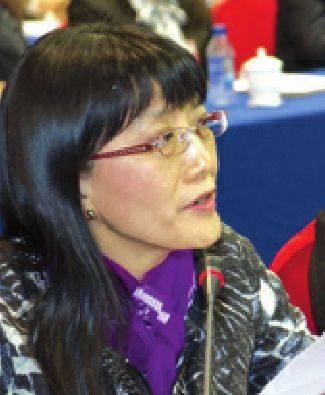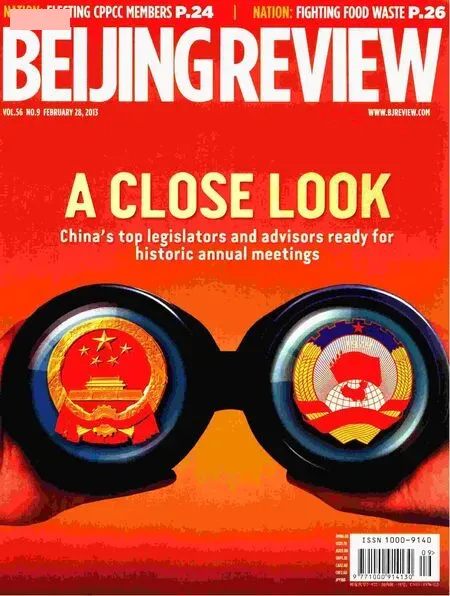Roll Call for political Advisors
2013-04-29ByWangHairong
By Wang Hairong
The First Session of the 12th National Committee of the Chinese Peoples Political Consultative Conference(CPPCC), Chinas national political advisory body, will convene in Beijing on March 3, two days before the First Session of the 12th National Peoples Congress (NPC), the countrys top legislature.
The principal function of CPPCC national and local committees is political consultation, democratic supervision and participation in the discussion and management of state affairs, according to the CPPCC Charter.
Xinhua News Agency released the 2,237-name roster of the 12th CPPCC National Committee on February 2. Yu Zhengsheng is the only member of the Standing Committee of the Political Bureau of the 18th Communist Party of China (CPC) Central Committee listed and is expected to serve as the new CPPCC National Committees chair.
The full session of the CPPCC National Committee is an annual event. This years session is noteworthy because members will elect the organizations new leaders while top state and government leaders will be elected by NPC deputies. CPPCC National Committee members will also hear and deliberate the Government Work Report and examine issues of public concern.
Member selection
CPPCC members are selected from the CPC and other political parties, personages without party affiliation, mass organizations, ethnic minorities, and individuals from all walks of life, including representatives from Hong Kong, Macao, Taiwan, as well as overseas Chinese and other specially invited people.
“As the duty of CPPCC members is to offer political advice, only those competent to fulfill this important duty can be appointed,” said Li Changjian, Deputy Secretary General of the 11th CPPCC National Committee.
Li said that CPPCC members should simultaneously possess the qualities of a political theorist, thinker, social activist and reformer, and should courageously uphold public interests and always maintain honesty.
According to Xinhua, of all the 2,237 members of the 12th CPPCC National Committee, 39.9 percent are CPC members; women make up 17.8 percent of membership, a greater proportion than the last conference; and 11.5 percent are from minority ethnic groups, with all 56 ethnic groups represented.
New CPPCC National Committee members average 56.1 years old, and of whom, 94.9 percent are college educated. A little more than half served in the 11th CPPCC National Committee during the previous five years, whereas 1,080 of them are new to the organization.
Information at the CPPCC National Committees website shows that CPPCC National Committee members are selected according to the following procedures:
First, candidates to the CPPCC National Committee are recommended by political parties, influential persons without party affiliation, mass organizations, ethnic groups and social sectors through negotiation. Then the candidate list is submitted to relevant organizations under the CPC Central Committee for deliberation.
Yang Chonghui, Deputy Secretary General of the 11th CPPCC National Committee, said that candidates representing the CPC are reviewed by the CPC Central Committees Organization Department while other candidates are reviewed by the CPC Central Committees United Front Work Department.
After that, the Standing Committee of the previous CPPCC National Committee approves new national committee members by simple majority, publishes the name list and issues certificates to new members.
Members of the 12th CPPCC National Committee are grouped into 34 units or “circles”corresponding to various social sectors, including nine for political parties and one for influential persons without party affiliation. Eight circles represent mass organizations such as the Communist Youth League of China, the All-China Federation of Women, the All-China Federation of Taiwan Compatriots and the All-China Federation of Returned Overseas Chinese.
Eleven circles correspond to social sectors such as culture and art, science and technology, social sciences, economics and agriculture.
The remaining five circles respectively represent ethnic minorities and religious bodies as well as Hong Kong, Macao and other geographic areas.
Mo Yan, the 2012 Nobel Laureate in Literature, was appointed to the Culture and Art Circle, and Yao Ming, a former NBA star with the Houston Rockets, selected into the Sports Circle.
In recent years, profound changes have taken place in Chinese society, so the circles should be changed to reflect these changes, Li said during last years full session of the CPPCC National Committee.
Composition of the circles has been changed somewhat in the CPPCCs history of more than six decades.
For instance, in 1954, one circle represented farmers in agricultural collectives. In 1978, as the country began to implement the reform and opening-up policy, farmland was contracted to individual farmers and the circle was removed, while one representing sports and athletics was created. At the First Session of the Eighth CPPCC National Committee convened in 1988, a circle comprising economists and business people was added to reflect the countrys emphasis on economic development.
More changes are necessary in the future, said Chen Jiping, Executive Vice President of the China Law Society. He suggested that a circle for legal experts should be added.
Role and reform
The CPPCC serves as a key mechanism for multi-party cooperation and political consulta- tion under the leadership of the CPC.
In September 1949, the First Session of the CPPCC National Committee was held in Beijing. It adopted the Common Program of the CPPCC, which served as a provisional constitution of the Peoples Republic of China, and created the central peoples government.
Before the NPC was established in 1954, the CPPCC National Committee had served as the de facto legislature of the country.
Over the past decades, the CPPCCs role in the countrys political affairs has become increasingly important.
Since assuming posts in March 2008, members of the 11th CPPCC National Committee had put forward 28,930 proposals.
A number of proposals, such as those on reducing vehicle exhaust and improving conservation of grasslands and the rural environment, were adopted by the government into policies.
Such proposals as those on the reform of public hospitals, the national system of basic medicines and holiday-season highway toll exemptions have contributed to improving peoples livelihood and social progress.
Members of the 11th CPPCC National Committee also had helped push the legislature to adopt the Mental Health Law, revise the Personal Income Tax Law and write drunk driving into the Criminal Law.
While some members have fulfilled their obligations as political advisors, other members, particularly sports and entertainment celebrities, have been questioned for their competence.
Liu Xiang, who won gold in the mens 110-meter hurdles final at the 2004 Athens Olympics, triggered controversy for asking for leave from four of the five annual sessions of the 11th CPPCC National Committee, of which he was a member.
Lius excuses were either to compete abroad or to train for upcoming games. In 2011, the only year that Liu participated in the entire annual session of the CPPCC National Committee, he did not put forward any proposals.
Critics argue that now that CPPCC members such as Liu do not have time to serve as political advisors, the chance should be given to people who are more able to do so.
Earlier this year, Hong Kong movie director Stephen Chows absence from the six-day annual full session of the CPPCC Committee of Guangzhou, south Chinas Guangdong Province, again fueled debate on a celebritycum-political advisors role. Local media said that Chow, who was busy promoting his latest movie, only showed up in the meeting hall for around 80 minutes at the opening of the session.
The widespread questions speak volumes about the public discontent with the CPPCCs current selection mechanism.
In January, Ma Xiangbin, a freelance commentator, suggested in an article in Shaanxibased Huashang Daily that a performance appraisal system should be set up for CPPCC members, and those failing to fulfill their duties should be asked to resign.
The CPPCCs local committees have piloted some reform initiatives. In 2010, Shenzhen in Guangdong began to select its CPPCC members through election. The CPPCC Guangzhou Committee recently launched a performance evaluation system, under which its members are rated for meeting attendance and performance in doing research, writing reports and submitting proposals.
